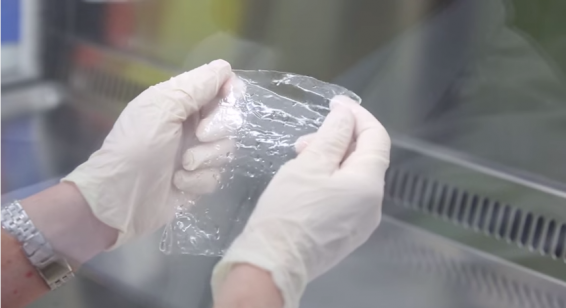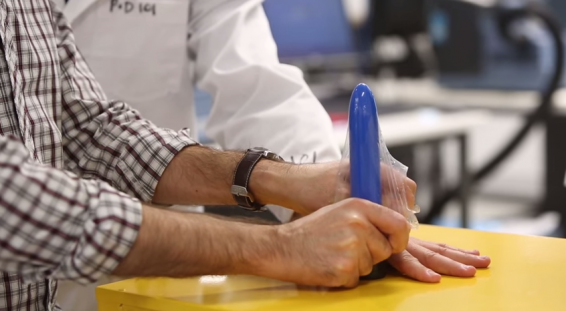Step aside, latex. There’s a new sheriff in condom material town, and its name is hydrogel.
The University of Wollongong in Australia has been working hard to create a latex alternative that feels more natural and can be a more enticing and enjoyable way to have safer sex. Hydrogel is designed to mimic the tactile feeling of human skin and is intended to provide a safe and pleasurable sexual experience for both partners.
Hydrogel is a perfectly clear and stretchy material which is made up almost entirely of water molecules, which are held together by polymer chains. Natural sources of these polymer chains come from seaweed and shrimp shells (yes, that’s right– in the future, the roaches of the sea may prevent unwanted pregnancies). But, the plan is to use synthetic materials in the mass produced versions of hydrogel condoms.

Scientists specify that hydrogel and tough hydrogel are two separate materials. As the name implies, tough hydrogel is superior to the mechanically weak regular hydrogel. Tough hydrogel is capable of being extremely resilient and can recover from large strains. Testing of these tough hydrogels has revealed that they can stretch up to 1000 times their original size and return to their original shape and size afterwards.
Hydrogel condoms are a step in the right direction for those who are allergic to latex and are limited to options such as Trojan NaturaLambs, which are not vegan-friendly and do not prevent against STDs, only unwanted pregnancy. Other alternatives to latex include polyurethane condoms like the Trojan BareSkin Non-Latex Supra and polyisoprene condoms like the LifeStyles SKYN Large but these have limited sizes and are pricier than latex condoms.
In the same vein, those who suffer from lubricant allergies will be very happy to hear that the hydrogel condoms will be self-lubricated (since they are made from water molecules). This is already proven in optometry, as hydrogel is a biocompatible substance that has been used in the production of soft contact lenses (which stay wet when worn) for years. Using a condom which doesn’t need additional lubricants will also cut down on failure rates due to people using oil-based lubes with latex condoms, which often results in breakage.

Another plus for tough hydrogel condoms, aside from their transparency, skin-like feeling and super strength, is their biodegradability. This is a sharp contrast for latex condoms, which are made from harvested sap (which can lead to forest damage and deforestation) and for non-latex condoms which can sit in a landfill for years without decomposing. At least all of these condoms’ packages are recyclable, as long as you don’t mind the neighborhood seeing the wrappers in your bin.
Staying on the cutting edge of technology, 3-D printers are making a name for themselves in the safer sex world with the widely popular, and somewhat addictive, Dildo Generator and now with the production of condoms as well. Although hydrogel could be formed into molds and manufactured much like the way latex and non-latex condoms are being made nowadays, the plan is to minimize cost of production by employing 3-D printing technology to construct these tough hydrogel condoms.
So what’s the hold up for these condoms of the future hitting the worldwide market shelves? Like the much anticipated Vasalgel, we ravenous safer sex consumers are just waiting on testing, testing, and more testing. One of the testing criteria is to find out definitively whether or not hydrogel is effective against blocking the transmission of tiny particles such as sperm, bacteria and viruses.
